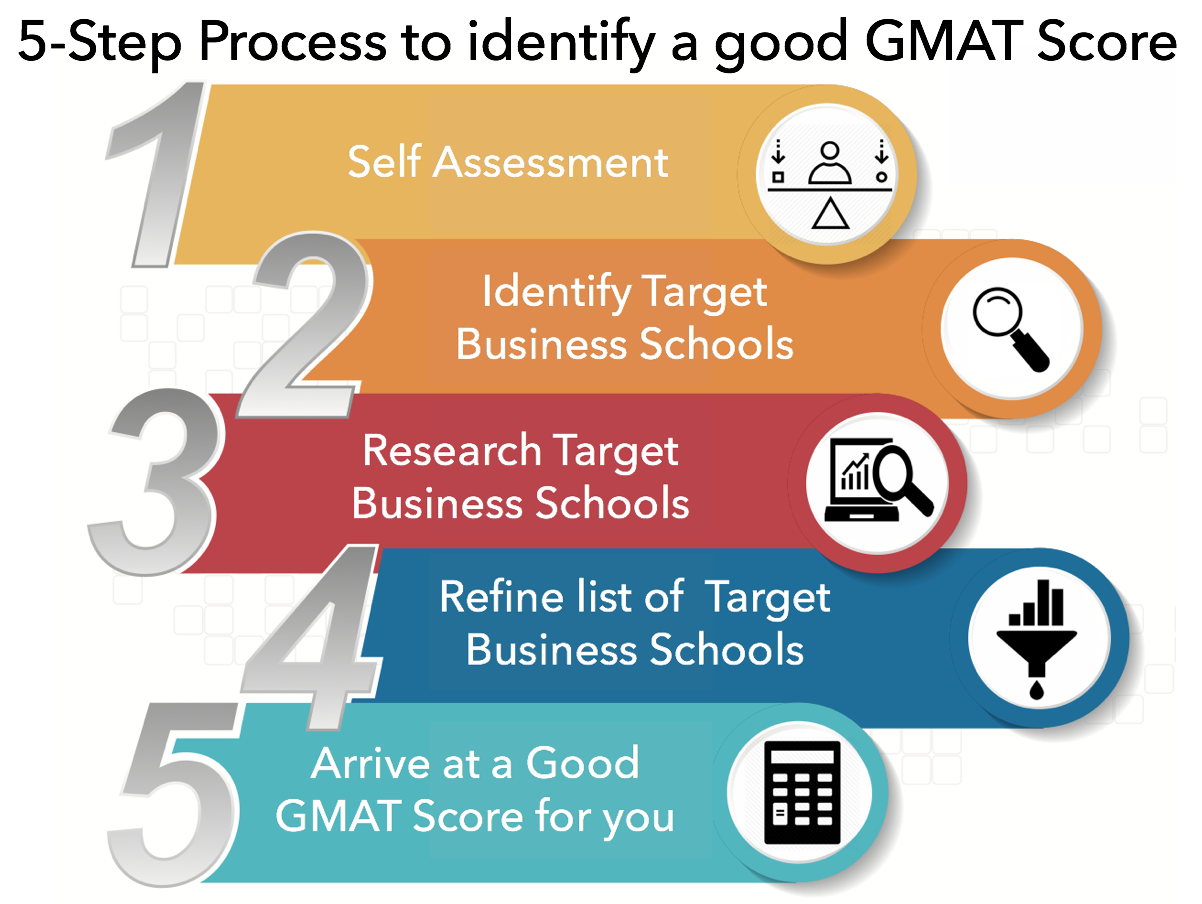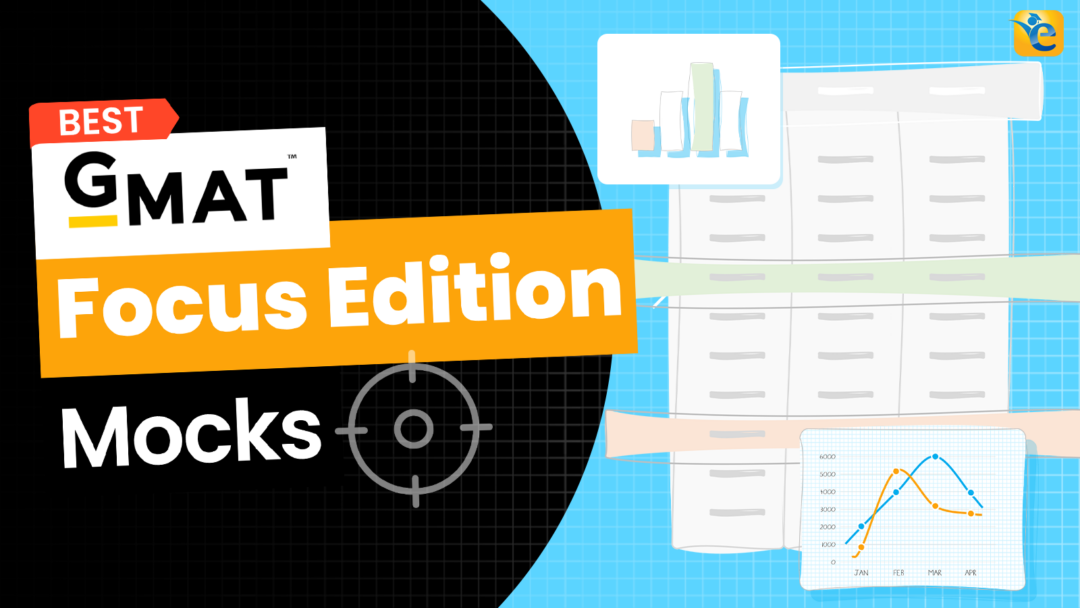If you’re planning to apply to a top business school, achieving a good GMAT score is crucial. This article provides a straightforward five-step guide to help you figure out and achieve your best GMAT score.
Understanding GMAT
The GMAT, administered by GMAC, is a pivotal computer-adaptive test for MBA admissions. It evaluates analytical, quantitative, verbal, and reading skills, playing a crucial role in business school applications, assessing readiness for advanced studies in business and management. Starting February 1, 2024, the GMAT has been upgraded to the new edition, although scores from the previous version (GMAT 10th Edition) will remain valid for 5 years from the date of the exam.
So what exactly is considered a good score?
Generally, a good GMAT 10th Edition (GCE) score falls within the range of 700 (87th Percentile) to 740 (97th Percentile) which translates to 645 (87th Percentile)- 695 (97th Percentile) on the new GMAT Focus Edition (GFE), while a score of GCE 740/GFE 695 or higher is deemed excellent.
Read this article to understand GMAT scoring system.
Deciphering GMAT Average Scores : Regional Insights for Business School Admission:
- United States : GCE 713 / GFE 665, Range: GCE 670 / GFE 615 to GCE 737 / GFE 685
- Europe : GCE 679 / GFE 635, Range: GCE 642 / GFE 595 to GCE 714 / GFE 665
- Canada: GCE 520 / GFE 495 to GCE 780 / GFE 755
- Australia : GCE 600 / GFE 545 to GCE 695 / GFE 635
Important Note on GMAT Focus Edition (GFE) Data: This blog provides translated information on GFE average scores, accepted scores at top business schools, and subsectional scores from GMAT 10th Edition (GCE) data. As of now, specific GFE data is not available. Our translations aim to give insights into expected scores since GCE is phased out and GFE has become the primary GMAT format.
A good GMAT score varies from person to person and depends on the target business schools. Therefore, what we need to understand first is that ‘good’ is a relative term. One score might be good for one business school but might not be suitable for another.
Consequently, evaluating the average GMAT score of admitted students at your prospective business school serves as an initial benchmark. However, this is only the beginning of the process. In the wake of the GMAT focus edition, designed to emphasize specific skills, this article guides you through the steps to identify the optimal GMAT score for your individual circumstances in just five steps. We also delve into the factors that should be considered to comprehend – What truly is a good GMAT score?
In this article, we help you decide the best GMAT score for you and how to derive one in just 5 steps. We also discuss the factors that you need to consider to know – What is a good GMAT score?
A high GMAT score can set you apart from the competition and help you get an admit at your dream business school. Start your GMAT Preparation with the most reviewed online GMAT prep company. Try out our FREE Trial Today!
What is a good GMAT score?
A good GMAT score is an indicator of your sound intellectual aptitude and academic readiness. By scoring high on the GMAT, you are assuring the admission committees that you have the potential to not only ‘get in’ but also ‘get through’ the rigorous MBA program. It’s one of the reasons why the GMAT has the highest weightage in your MBA application.
| What is a good GMAT score? | GMAT 10th Edition (GCE) Score | New GMAT (GFE) Score |
| Average GMAT Score | 550+ | 525+ |
| Good GMAT score | 700+ | 645+ |
| Excellent GMAT score | 740+ | 695+ |
The GMAT 10th Edition (GCE) score ranges from 200 to 800, and each section (Verbal, Quantitative, Integrated Reasoning, and Analytical Writing Assessment) contributes to the overall score. Understanding the percentile ranking associated with your score is crucial, as it indicates how well you performed compared to other test-takers.
On the other hand, The GMAT Focus Edition (GFE) score ranges from 205 to 805. And each section (Verbal, Quantitative and Data Insights) contributes to the overall score). According to GMAC, the new GMAT Focus edition aims to assess better “higher-order critical reasoning and data literacy” skills crucial for tomorrow’s business world.
A noteworthy GMAT performance acts as a reliable predictor of your success in the initial year of business school. As of the latest data from 2023, two-thirds of GMAT test takers receive a Total Score between GCE 400/GFE 415 and GCE 600/GFE 555.
When you apply to a business school, you are competing against your peer. Thus a high score will set you apart. As pointed out by Ariba, an INSEAD MBA student, “One of the things that you start realizing is a lot of business schools have an international quota. So, if you have a lot of applicants from say India with an amazing application, then one way to filter out is the GMAT.”
Thus, to understand how high you should score on the GMAT, you also need to understand the GMAT percentile ranking, which will let you know how you did on the exam as compared to other test-takers. For example, an 88% percentile ranking means that you got a higher or equal total score than 88% of your peers and a lower overall score than 11% of other GMAT test-takers.
Did you know you can save upto 60+ hours of GMAT preparation by creating a structured GMAT study plan? Take a look at this video and learn how to create an effective GMAT study plan:
Total GMAT score – percentile ranking
Now, let’s examine the percentile ranking breakdown for the overall scores including individual percentiles for each subsection for students preparing for the GCE & GFE:

GMAT Sections:
| GCE Sections | GFE Sections |
| Quantitative – Score range 6 – 51 | Quantitative – Score range 60 – 90 |
| Verbal – Score range 6 – 51 | Verbal – Score range 60 – 90 |
| Integrated Reasoning– Score range 1 – 8 | Data Insights: – Score range 60 – 90 |
| Analytical Writing Assessment- Score range 0 – 6 |
Let us now look at the percentile rankings for the scores in each of the four sections:
GMAT: Sectional Score and Percentile Chart
GMAT Classic Edition:
| Verbal Reasoning (GCE) | Percentile Ranking(%) (GCE) | Quantitative reasoning (GCE) | Percentile ranking(%)(GCE) | Integrated Reasoning (GCE) | Percentile ranking(%)(GCE) | AWA (GCE) | Percentile ranking(%)(GCE) |
| 51 | 99% | 51 | 97% | 8 | 90% | 6 | 87% |
| 46 | 99% | 46 | 53% | 7 | 79% | 5 | 56% |
| 40 | 90% | 41 | 34% | 6 | 64% | 4 | 18% |
| 35 | 74% | 36 | 22% | 5 | 47% | 3 | 4% |
| 30 | 56% | 31 | 14% | 4 | 31% | 2 | 1% |
| 25 | 37% | 26 | 8% | 3 | 17% | 1 | 1% |
| 20 | 21% | 21 | 5% | 2 | 8% | 0 | 0% |
| 15 | 9% | 16 | 3% | 1 | 0% | ||
| 10 | 2% | 10 | 1% |
GMAT Focus Edition:
| Verbal Reasoning (GFE) | Percentile Ranking(%) (GFE) | Quantitative reasoning (GFE) | Percentile ranking(%)(GFE) | Data Interpretation | Percentile Ranking (%) (GFE_ |
| 90 | 100 | 90 | 100 | 90 | 100 |
| 89 | 100 | 89 | 97 | 89 | 100 |
| 88 | 99 | 88 | 95 | 88 | 99 |
| 87 | 99 | 87 | 94 | 87 | 99 |
| 86 | 98 | 86 | 92 | 86 | 99 |
| 85 | 96 | 85 | 89 | 85 | 99 |
| 84 | 91 | 84 | 85 | 84 | 98 |
| 83 | 86 | 83 | 81 | 83 | 96 |
| 82 | 79 | 82 | 76 | 82 | 94 |
| 81 | 70 | 81 | 71 | 81 | 90 |
Only the scores of the Quantitative and Verbal sections are considered for the total GMAT(GCE) score, which ranges between 200 and 800. For GFE, scores of Quantitative, Verbal and DI are considered with scores ranging between 205 to 805.
Read this article to understand GMAT focus score and percentile.
Do you also want a 705+ on the GMAT? Try out our Free Trial today and get access to 12+ hours of free interactive video lessons, 500+ GMAT-like questions, and AI-drive tools that help you track your progress. We are the most reviewed GMAT Preparation company on the GMAT Club, with 2900+ reviews!
Average GMAT score
This is an interesting aspect to cover. According to the GMAC, over 100,000 unique students took the GMAT test in 2022. If we include the repeat attempts, this number translates to a total of approximately 150,000 test attempts.
Of these, only 13% of the students score GCE 700/GFE 645 or more, only 1% score GCE 760/GFE 715 or more, and 87% usually fail to get what is considered a good GMAT (GCE) score.
According to GMAC, here is the average GMAT score based on test-takers between the period of January 2019 to December 2022:
| GMAT Section | Average GCE Score | Average GFE Score (approx.) |
| Quantitative score | 41.3 | 77.71 |
| Verbal score | 27.51 | 78.99 |
| Integrated Reasoning score | 4.65 | NA |
| Analytical Writing Assessment score | 4.43 | NA |
| Data Insights | NA | 74.41 |
| Total Score | 574.51 | 546.01 |
Thus, a good GMAT score depends on the business school you are targeting and what you are aiming for. Even a score of GCE 600/GFE 555 would be considered low at some schools. Business schools such as Wharton, Stanford, Kellogg, UC-Berkeley, Columbia, and MIT Sloan have average scores GCE 725/GFE 675 on the GMAT.
Please read this article to know – Which business schools will accept the New GMAT Focus Edition?
Let us now look at the factors that you need to take into consideration to identify a good GMAT score for you.
Factors to Consider to determine a Good GMAT score
There are four factors you need to take into consideration:
- Average Score of the last incoming class
- Profile of last year’s class
- Score required for Scholarship
- Estimated ROI on the GMAT score
Average GMAT Score of the last incoming class
A good score can be identified by looking at the average score of last year’s class. At this point, you should target a score that is 20+ points higher than this score.
For example, Wharton’s average GMAT score for the 2026 MBA class is 732, which is equivalent to 675 on the focus edition. Therefore, you should target at least 695+.
Score required for Top Business Schools
Ariba, an MBA student at INSEAD MBA, points out that you do need a decent score on the GMAT to get an admit. You should aim for a 655+ on the GMAT focus edition or even above to get into top business schools.
Another MBA student who got an admit from Harvard Business school and Stanford GSB states that “Your GMAT and GPA will give you a chance to get to the interview.” He scored 710 on the GMAT.
In general, the top MBA programs look for a score of GCE 725+/GFE 675+, whereas for the next set of business schools, the average scores of incoming students are usually in the GCE 650/GFE 595 -GCE 720/GFE 665 range.
Here is the table that represents the average score for some of the top business schools in the US, India, Canada, and Australia:
Average GMAT score for top business schools in the United States of America:
| Business School Name: | GMAT Score (Class of 2026) | GFE Score Translation (Class of 2026) |
| The Wharton School | 732 | 675 |
| Harvard Business School | 740 | 685 |
| Stanford Graduate School of Business | 738 | 685 |
| Booth School of Business | 729 | 675 |
| Kellogg School of Management | 733 | 675 |
| MIT Sloan School of Management | 730 | 675 |
| Dartmouth Tuck | 727 | 675 |
| Columbia Business School | 732 | 675 |
| UC Berkeley (Haas) | 730 | 675 |
| Yale School of Management | 730 | 675 |
Average GMAT score for top business schools in Europe:
| Business School Name: | GMAT Score (latest incoming class) | GFE Score (latest incoming class) |
| INSEAD | 708 | 655 |
| London Business School | 708 | 655 |
| Cambridge (Judge) | 697 | 645 |
| HEC Paris | 690 | 635 |
| IESE Business School | 681 | 615 |
| Oxford (Saïd) | 680 | 635 |
| IMD | 680 | 625 |
| IE Business School | 650-770 | 595-735 |
| Mannheim | 600+ | 555+ |
| SDA Bocconi | 665 | 615 |
Average GMAT score for top business schools in Australia:
| Business School Name: | GMAT Score (latest incoming class) | GFE (latest incoming class) |
| Melbourne Business School (2019) | 695 | 645 |
| Australian Graduate School of Management (AGSM) 2020 | 670 | 615 |
| Monash Business School | N/A | N/A |
| University of Queensland Business School | 600 | 555 |
| MGSM Macquarie | 680 | 615 |
| University of Sydney | 600+ | 555+ |
Average GMAT score for top business schools in Canada:
| Business School Name: | GMAT Score | GFE Score |
| University of Toronto – Rotman School of Management | 678 | 615 |
| McGill University – Desautels Faculty of Management | 675 | 615 |
| York University – Schulich School of Business | 660 | 615 |
| Western University – Ivey Business School | 660 | 615 |
| HEC Montreal | 630+ | 585 |
| Queen’s Smith School of Business | 654 | 615 |
| Alberta School of Business | 550+ | 515+ |
| UBC Sauder School of Business | 650+ | 595+ |
| Concordia University – John Molson School of Business | 580 + | 545+ |
| Sobey School of Business | 590 | 555 |
A high GMAT score can set you apart from the competition and help you get an admit at your dream business school. Start your GMAT Preparation with the most reviewed online GMAT prep company. Try out our FREE Trial Today!
Aspiring to score 705+ on the GMAT? Watch this video:
Profile of last year’s class
Let’s pick Wharton as an example GCE 750+/GFE 695+ on the GMAT is a good score, which will increase your chances of getting an admit from Wharton. However, the chances of your admission will depend on the level of competition in your candidate pool. At the end of the day, Wharton, like any other business school, is trying to build a diverse class.
For example, if you are a software engineer from China, your candidate pool is highly competitive. A good GMAT score for you would be at least 30-40 points higher than the average score of Wharton i.e. GCE 760+/GFE 715+.
On the other hand, if you are an investment banker from Mexico, yours is a low-competition candidate pool. You could get an admit from Wharton with a 720 on the GMAT.
Anuj, an Indian engineer with 6-year work experience in Petroleum and Energy industry, received an admit from Duke with a 770 on the GMAT. On the other hand, Guillermo received an admit from Wharton with a 710 score and a 5-year work experience in Finance.
The crux of this whole analysis is that the best GMAT score is the one that will distinguish you in your candidate pool.
Score required for MBA Scholarships
According to Jon Fuller, a former admissions director at the University of Michigan Ross School of Business states that “Someone with a GCE 770/GFE 735 GMAT is much more likely to get a financial award than someone with a GCE 670/GFE 615.”
A study shows, if you score 20 points higher than the median GMAT score of your desired business school, you have high chances of getting a good scholarship amount.
Thus, a general thumb rule is targeting a score higher than the Business’s incoming class score. For example, if you are targeting the top 10 B-schools, GFE 685+ will make your application more lucrative. If you are targeting the top 25 B-schools, then a score of GFE 665 can do the trick.
Read this article to know more about How to get a scholarship for an MBA in 2023?
Estimated ROI on the GMAT score
We have estimated that the incremental ROI of a GFE 675+ GMAT Score over GFE 645 is $500K+, the highest it has ever been. A 675+ on the GMAT or higher helps in getting into top business schools, and the career outcome at these business schools is far higher than others.
Also, as stated earlier, a high score is likely to attract the right amount of scholarships, which will, in turn, reduce your MBA cost and have a positive impact on the ROI.
Thus, look into your targeted business school’s average score and class profile. This will give you an idea about what should your targeted score be. Also, if you are planning to apply for scholarships, then you might have to rethink your targeted GMAT score.
What is a Good GMAT Score? A 5-Step Guideline
- Self Assessment
- Identify your target Business Schools
- Research your target business schools
- Refine the list of target business schools
- Arrive at a good GMAT score for you

Take a free GMAT Focus mock to understand your baseline score and start your GMAT prep with our free trial. We are the most reviewed online GMAT Prep company with 2900+ reviews on GMATClub
Once you have considered these factors, follow this 5-step process, and you’ll be able to identify what is the best GMAT score for you:
1. Self-Assessment:
To reach your target business school, you must first know your starting point. There are two aspects to assessing yourself.
- Identifying your current score. The best way to achieve this is to take a diagnostic test.
- Assess your profile on the basis of the following factors:
- Pre-MBA industry
- Nationality
- Gender
- Average GPA
- Average age
The purpose of this step is to establish a baseline. It will give you an idea of where you are as of now, and following step 3 will provide you with an idea of where you want to go and the gap you have to fill.
For example –
If you get a score of GFE 445 in the diagnostic test and you have two months left for the application deadline, then it would be difficult to improve to a GFE 645 score level in that amount of time.
Therefore, establishing a baseline score is essential.
2. Identify your target Business Schools

Once you are done assessing yourself, you should then identify your target business schools. The factors to consider here are your career goals. If you want a career in Finance, Wharton is a business school, and you should target it. If you want a career in consulting, Booth is the school you should focus on.
Here are top business schools for Marketing, Finance, Technology, Operations, Entrepreneurship, and Consulting.
3. Research your target business schools
There are two aspects you need to research on, for your target business school
- The average score of last year’s incoming batch
- Last year’s class profile
4. Refine the list of target business schools

Now you have an idea about a good score for you and are clear on your career goals. You should refine your list of business schools and divide them into three categories:
- Reasonable ones (Your profile and score are a good fit)
- Optimistic ones (You are pushing your luck here, but there is a small chance of admission)
- Safety nets (You are almost sure of an admit)
5. Arrive at a good GMAT score for you
Once you a refined list of your target business schools, compute a score for yourself by taking the factors into consideration:
- Understanding the competition level in your candidate pool
- The average score of the last incoming class
- Getting the Scholarship
- Analyzing the ROI
Let’s have a look at the above process with the help of an example.
If you are from an over-represented applicant pool like an IT engineer working in information, technology, or engineering, a higher score can increase your chances of an admit.
For example,
You are an Indian Engineer with 4-5-year work experience, and your baseline score is GFE 615 at the moment. At this point, you wish to target the top 10 business schools.
After considering your candidate pool competition and the average GMAT score of your target business schools, the best score would be 30+ points higher than the maximum average of the business schools.
Stanford GSB has an average score of GFE 685. Therefore, you should get around GFE 715 and above to stand out.
If you are not left with enough time for preparation, then you can refine your list to the Business Schools from rank 6 to 15. With the same process, a good GMAT score for you would be GFE 695 and above.
If you are planning to take the GMAT, we can help you with a personalized study plan and give you access to quality online content to prepare. We are the most reviewed GMAT prep company on gmatclub with more than 2900+ reviews, as of August 2025. Why don’t you take a FREE Trial and judge it for yourself?
The Graduate Management Admissions Test (GMAT) is a 2 hour 15 minutes long Computer adaptive test. It has three sections:
1. Verbal
2. Quant
3. Data Insights
Here is an article to help know all about the GMAT Exam.
Generally, a good GMAT Classic Edition (GCE) score falls within the range of 700 (87th Percentile) to 740 (97th Percentile) which translates to 645 (87th Percentile)- 695 (97th Percentile) on the GMAT Focus Edition (GFE), while a score of GCE 740/GFE 695 or higher is deemed excellent.













